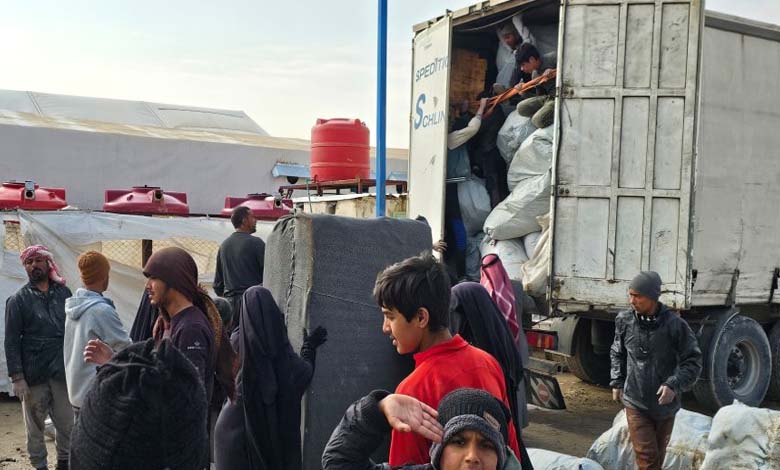Societal and Bureaucratic Complexities Hinder Reintegrating Iraqis Returning from Al-Hol Camp

The main obstacles faced by returnees from Al-Hol camp are difficulty obtaining official documents, securing employment, and being forced to disavow first-degree relatives suspected of links to ISIS.
-
Crimes Against Humanity and Genocide: UN Commission Presents Evidence Indicting ISIS in Iraq
-
After a series of government dismissals, fears of the return of the political crisis in Iraq
Iraqis repatriated from Al-Hol camp – run by the Kurdish self-administration in northeast Syria and housing displaced persons and families of alleged ISIS members – face significant challenges reintegrating into their communities.
After many years in the Syrian camp, Farah Ibrahim Darwish was at last granted permission to return to Iraq. Yet, his return proved far more difficult than expected.
To enter his hometown, local authorities required a letter in which he renounces two of his sons, jailed for suspected ISIS affiliation – claims he strongly denies.
-
Political crisis in Iraq: 3 possible scenarios
-
After the events of Geweran prison and the operations of ISIS in Iraq… Where does the organization get their money?
At 64, he says: “All I wanted was to return to Iraq,” but the return has come at a high cost: “I disowned two of my sons (…) and now I have neither home nor farm. I’m under the poverty line, crushed by injustice.”
An AFP correspondent, after interviewing over 15 people – returnees, aid workers, and a lawyer – most of whom asked for anonymity for security reasons, documented multiple barriers: obtaining ID documents remains difficult, and many are forced to sever ties with suspected relatives.
A senior Iraqi security official stated that the government provides many facilities to aid integration – issuing personal documents and helping with job prospects – and stressed that disavowal letters have been illegal for years. He urged reporting any such demands to authorities.
-
Pro-Iranian militias back ISIS in Iraq
-
UN Support for Regularizing Their Status: How Will the Iraqi Government Deal with Returnees from Al-Hol Camp?
A lawyer representing several returnees explained that disavowal promises function like intra-family criminal complaints. He warned against the misconception that such letters are required to obtain official documents like ID cards and birth certificates.
Darwish obtained permission to leave Al-Hol in 2022 after receiving security clearance and tribal support.
Back in Iraq, he spent months at the “Center of Hope for Psychosocial Rehabilitation” (formerly Al-Jada’a Centre), awaiting further approvals from Iraqi authorities before returning home.
-
Will Iraq’s Plan to Rehabilitate Returnees from Syrian Displacement Camps and Prevent Extremism Succeed?
-
Hundreds of ISIS women continue their strike in an Iraqi prison… What are the risks?
“In Iraq, they welcomed me warmly,” he says. However, before returning to Salah al-Din province, he reluctantly agreed to disavow his two sons to gain entry to his hometown.
“My family is 11 people… I’m old, without income or livelihood. If I can’t provide, how will we live?” He found his home destroyed and had to rebuild two rooms to shelter his family.
Thanasīs Kambanīs, director at Century International Studies in New York, says returnees face “an unclear future,” especially since those from families of ISIS affiliates “are often denied essential documents for healthcare, education, and employment.”
“At minimum, punishing entire families of suspects is unjust collective punishment and an ethical wrong. At worst, Iraq’s policy creates fertile ground for violent sectarian extremists,” he warns.
A thirty-year-old woman, speaking anonymously, fears returning to Salah al-Din where her father died in custody after returning. Now in fragile housing in Mosul, she worries about eviction and the possibility of having to “disown” her husband to get documents.
While she thanks the authorities for rescuing her from Al-Hol, where violence is increasing, she insists on the need to resolve the paperwork crisis: “We need their support to move forward.”
-
Iraqi security arrests 32 ISIS elements in security operation
-
Repeated operations – Why ISIS Is Making a Comeback in Iraq?
Unlike many countries that refuse to repatriate Al-Hol residents, Iraq is accelerating the process. Nearly 17,000 people, mostly women and children, have returned so far. Local and international NGOs assist integration.
The Geneva-based Global Resilience and Reintegration Fund, focused on countering extremism, supports several grassroots centres that have aided about 6,000 returnees.
Kevin Osborne, speaking for the fund, explains they provide psychosocial support and vocational training to ease reintegration. However, recent U.S. cuts to foreign aid are hampering these efforts.
-
Iraq Tries to Overcome Political Crisis after New President Elected
-
Iraq crisis awaits ‘decisive decision’ – Supreme Court settles the fate of parliament
He asserts that increasing returns requires “expanding support to adequately prepare communities and enable smooth, sustainable reintegration.”
Nouran Mahmoud of the Iraqi Development Foundation, also funded by the fund, notes many returnees fear “social rejection and stigma” and face economic, social, and psychological challenges.
Her organisation in Mosul offers counseling; many deal with anxiety, insomnia, and depression. Educational programs are also provided.
Rahaf (24), who is receiving support to address long-standing trauma, has resumed middle school thanks to the local NGO. She says, “I feel successful (…) I want to work in law or education.”












